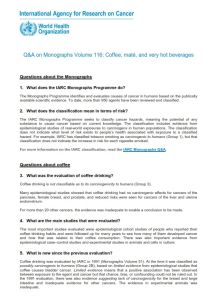Join getAbstract to access the summary!

Join getAbstract to access the summary!
International Agency for Research on Cancer
Coffee, Maté, and Very Hot Beverages
IARC, 2016
What's inside?
If you can’t kick the coffee habit, maybe switch to iced coffee.
Recommendation
In the early 1990s, the International Agency for Research on Cancer (IARC) classified coffee and hot maté as possible carcinogens, substances that can cause cancer in humans. Approximately a quarter of a century later, the agency’s researchers looked at new studies to re-evaluate its former findings. In this Q&A, accompanying a monograph on the subject, the IARC explains why the beverages were classified as possible carcinogens in 1991 and outlines what has changed since that original evaluation. getAbstract recommends these insights to public health professionals and coffee and maté enthusiasts.
Summary
About the Author
The International Agency for Research on Cancer is the specialized cancer agency of the World Health Organization dedicated to promoting international collaboration in cancer research.

















Comment on this summary